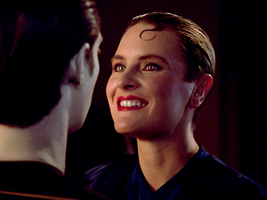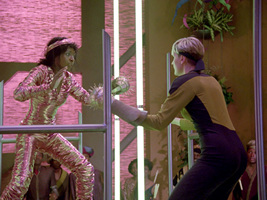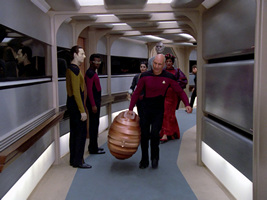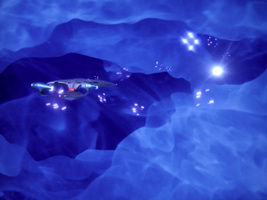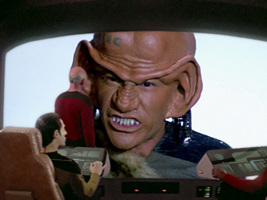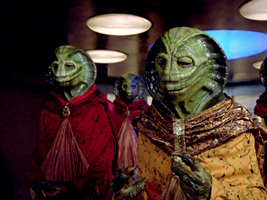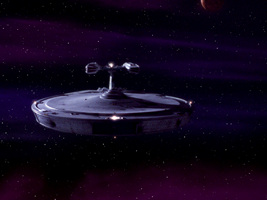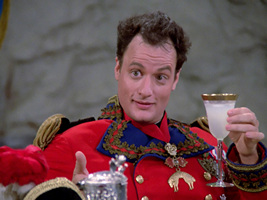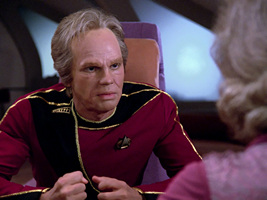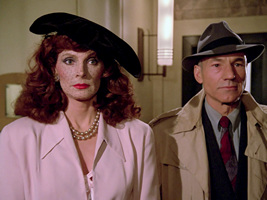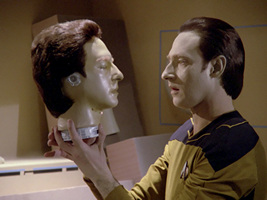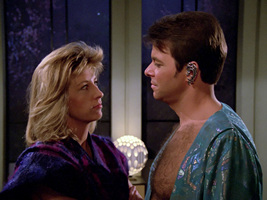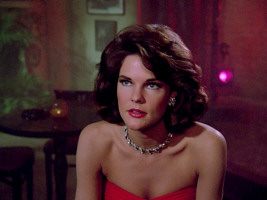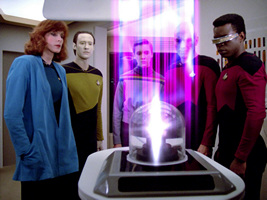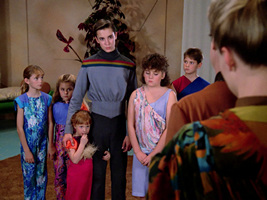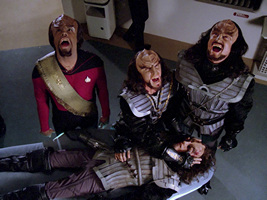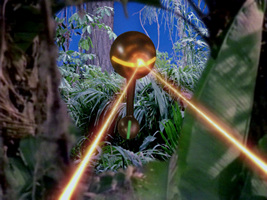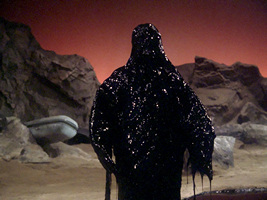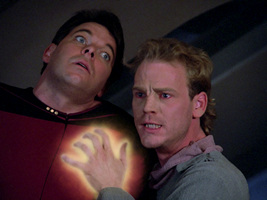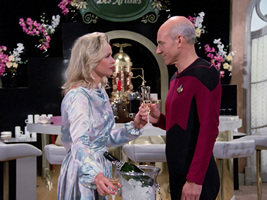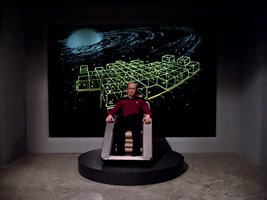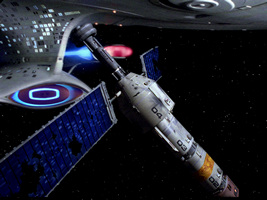The Next Generation (TNG) Season 1 Guest Reviews
Season 1Season 2Season 3Season 4Season 5Season 6Season 7
Encounter at Farpoint
Synopsis
Stardate 41153.7: Synopsis in main TNG listing
Commentary
This was not a bad episode, however it does have a sense of silliness that reminds me of TOS. The first 15 minutes seemed rushed like a TAS episode, and then the last hour seemed to drag on. The actions of Picard appear rushed and rash to me in the beginning of the show. After only 15 minutes since the opening credits we already see the ships saucer separating. I found much of "Encounter at Farpoint" difficult to understand compared to most Star Trek episodes (although I admit I do have Auditory Processing Disorder). Fortunately, TNG soon develops into a much better show than what we see in "Encounter at Farpoint".
Character development started out well in the TNG pilot. We already know about Riker's Incident on the USS Hood, about Dr. Crushers past and her son, about Geordi's blindness and VISOR, and about Lieutenant Yar's crappy childhood. We don't know much about Worf yet, but we learn a lot more about him later in TNG and DS9. The appearance of Dr. McCoy was a very nice touch that gave a connection between the new TNG and TOS.
Annotations
- Remarkable ship: The USS Hood appears to be an Excelsior class starship. It was only right before this in ST:TSFS and ST:TVH where the excelsior class was a new starship. However, in "Encounter at Farpoint", it is portrayed as old since it is so small compared to the large galaxy class USS Enterprise-D.
- Remarkable character: Admiral McCoy makes an uncredited cameo appearance at the end of part 1. It is nice to see the old doctor with his familiar personality (and complaints about Vulcans). I have one question though: Do all humans in this time period live to be in their 130's?
- Nitpicking: This is the only episode where Troi wears the short skirt uniform similar to that seen in TOS. For the rest of the season she wears a much different outfit and a much different hairstyle. What was wrong with her appearance in this episode?
Rating: 5 (Chris)
Encounter at Farpoint
Synopsis
Stardate 41153.7: The new Galaxy Class Enterprise D is introduced along with its crew and its captain, Jean-Luc Picard. En route to planet Deneb IV to inspect the new Farpoint Station the new ship and crew are put to an early test when they encounter the all-powerful Q entity. Q puts Picard and his understaffed bridge crew on trail for humanity's crimes in a post World War III courtroom, with Q as the judge and jury. Picard convinces Q to allow him to prove how far humanity has progressed, and Q agrees, letting the Enterprise continue to Farpoint Station with a warning: that this mission will be more challenging than any of them can imagine. Meanwhile Commander Riker, the new first officer meets Doctor Crusher and her son, Wesley, and Geordi LaForge, during which time strange things begin to happen. When Riker returns to the Enterprise, the real mission can begin. The crew inspects Farpoint Station and it meets with their approval, when an alien vessel enters the system. It is learned that the alien is the Station's "mate" that the inhabitants of the planet forced to take the form of the station. The station alien and its mate leave, and Farpoint Station is no more.
Commentary
"Encounter At Farpoint" is a fine example of a good pilot episode, which was written by Original Series writer Dorothy "DC" Fontana and Gene Roddenberry himself. Unlike its predecessor, this episode allowed for a proper introduction of the characters since the show was already sold as a series. This allowed for the opportunity to see the characters during their first meeting with each other and allowed the characters to develop a backstory. The storyline involving Q was added in later in the writing process after it was decided to make the show a two hour made for TV movie. The courtroom scene when Q put the crew on trial for humanity's crimes as a "dangerous, savage child race" was interesting and well done. The camera work for that scene was excellent. The scene would be redone in "All Good Things...". Notice that Colm Meaney's character wears a red uniform and wears an ensign's pip. He would later wear a gold uniform and wear a Lieutenant's pips before he recieved his half-pip as a chief.
The look of the new series wouldn't change much from the pilot to normal production. Troi's "skant" cheerleader uniform was done away with as was her extremely emotional reactions to her telepathic senses.
Overall a good story with strong character development and a great introduction to Q. In my opinion, it was a great start to a great series.
Annotations
- Remarkable scene: The Enterprise ship separation sequence has to be one of the coolest shots in all of TNG. It would later be used again a few more times.
- Remarkable quote: "Let's see what's out there. Engage." -Captain Picard
- Amazing aliens: The floating, glowing "jellyfish aliens" were amazing and very realistic.
- Remarkable cameo: DeForest Kelley turns up as the 117 year-old "Admiral" McCoy in a touching scene that helps bridge the gap between the generations. I find his conversation with Data to be amusing, especially when he compares Data to a Vulcan.
- Awesome ship: The Enterprise D is a beauty!
Rating: 7 (Nathaniel Scripa)
Encounter at Farpoint
Synopsis
Stardate not given: Synopsis in main TNG listing
Commentary
I actually have little to say about the premier episode of TNG. It pretty much sets out to accomplish all it needs to, just not in a breathtaking way for it does suffer in some parts, but for now, the good.
Character development is excellent, Picard makes it clear he is not a family man though the looks he and Dr. Crusher share make it clear there's some deeper connection between the pair. Riker and Troi are the jaded ex-lovers now forced to serve together. Data aka Pinocchio talks of his ambition to be human despite his super-strength and intelligence. Geordi, Worf and Yar miss out but for Yar briefly mentioning her upbringing on a hostile planet clearly outside the jurisdiction of the noble Federation.
From the start we're made very clear that Picard isn't the same gun-ho, ambitious Captain that Kirk was, Picard's more cerebral about his captaincy, not afraid to back down when it's clear a superior force threatens them as Q does.
John De Lancie is brilliant as Q and will continue to be for his many, many appearances. He certainly saved his best work for TNG having Picard as a sparring partner, and I'm sure to discuss that at great length. Here he tests Picard though, challenging them to rise up above their reputation as a brutal, savage species. So the theme of the episode is just about Picard taking every opportunity to prove as such and he succeeds after it's discovered that Farpoint Station is actually a space-dwelling alien kept prisoner which the Enterprise frees to unite it with its mate again.
The Enterprise herself is a beautiful vessel, seeing it soar past in the opening credits adds a real sense of scope.
To the not so good, well, I know it's just the start, but two characters bugged me. Troi and her monotonous delivery of every second line and melodramatic delivery of every third when conveying other emotions as is her half-Betazoid nature. It was really cringeworthy to see her projecting these emotions she felt so forcefully, I also am not much of a fan of her hair and appearance in this episode. As a matter of fact the despised 'skant' (unisex skirt) makes many appearances in the earlier days of TNG, it took a few good men alot of courage to don those and be filmed wearing one. What were they thinking? And Wesley Crusher was an annoying pain in the ass and will continue to be so for a long time to come. With a little punk like that hanging around, it's no wonder Picard doesn't want children on the bridge. And just who the hell was the costume designer for Wesley's attire? For this episode and the remainder of his appearances he will be wearing the most outrageous looking clothing which looks neither futuristic or fashionable. The score at times was very overbearing as well.
The story itself is nothing too outstanding and a great deal more episodes about characters concealing the truth from the Enterprise crew will emerge. Perhaps I'd be judging this episode a little harshly as a result of knowing what's to come, but it still doesn't change the fact that it's not a very original script barring Q's testing of Picard.
As I said, it adequately introduced many things about TNG, the characters, a brief backstory for some, others: not so lucky. The holodeck, the communicator badges, the new transporting effects, establishing roughly a year as well. Those things were well introduced.
A satisfactory introduction, just, nothing outstanding.
Rating: 6 (Cameron)
Encounter at Farpoint
Synopsis
Stardate not given: Synopsis in main TNG listing
Commentary
Well the long awaited return of Star Trek to the TV screen certainly didn't come with a bang. I was too young to remember the first showing but it must have been a shocking departure from the original.
But then a lot of the pacing problems are due to the studio demanding a two parter for what was originally meant to be a single episode. This gives it a padded disjointed feel. It does set up Q nicely, he may come across as the cliché super being judging humanity but he develops as an important character over the years and is arguably the most fun character in this episode. The episode gets boring and it doesn't have any memorable moments, besides Picard surrendering which isn't a good start.
Considering the pilot and the first season as a whole if it wasn't for the Star Trek name the series wouldn't have made it.
Picard sums it up in the end with one of the best lines of the series. "No no number one, I'm sure our next missions will be far more interesting." Thankfully he was right.
Annotations
- Remarkable ship: The Enterprise had the best debut of the cast.
- Remarkable "why did they have it" story: Having a description of World War III in a series describing an optimistic future? So we'll have to leave it to future generations who'll be able to stop screwing things up.
- Remarkable actor: Marina Sirtis. Whatever you say about the character she always puts a great deal of effort into the character despite some truly awful material.
Rating: 4 (Nathan G)
Encounter at Farpoint
Synopsis
Stardate not given: Synopsis in main TNG listing
Commentary
I had mixed feelings over this 2 part episode back when it was new and just recently after watching. The story was interesting and I enjoyed how the Enterprise D main cast was introduced. However, their acting at times left a lot to be desired. Q was entertaining and came off as curious and playful at times when he was written to be an antagonist for this episode. Nice touch for the character rather than taking a cartoony super villain approach.
The saucer separation scene while cool went on for far too long. The concept was neat and something we sadly didn't see much more of during the series run. The Q "ship" was odd and appeared like some fireball and the net it casts over the Enterprise looked weak even back then.
The 2079 court scenes were fascinating and I found myself wanting more more about that dark period in Earth's history. Alas, we don't get much more of that in future episodes as well.
The strange jellyfish-like aliens at the end were less than thrilling nor interesting to look at and for giant beings that can alter their appearance seemingly at will, one would hope they could take a much more dazzling final form.
I found the rest of the episode fairly boring an unremarkable. A rough start to a overall remarkable Star Trek Series.
Rating: 5 (R.D. Lewis)
The Naked Now
Synopsis
Stardate 41209.2: Synopsis in main TNG listing
Commentary
Let's get drunk everybody! Sorry for the bad pun, but everytime I watch this episode I think it was a bad idea to recycle a storyline from TOS for the first regular episode of TNG. What I find really annoying about "The Naked Now" is that it also follows the same chain of events as "The Naked Time". The science station and the collapsing planet are replaced by the science vessel and the collapsing star, the crew gets literally drunk by the "polywater intoxication" and Wesley locks himself in engineering the same way Kevin Riley did. Add to that the stellar core fragment that threatens the Enterprise while her engines don't work. At least these last fifteen minutes of the episode create some suspense, everything that happens before is just a bad copy of the TOS episode. I also find it strange that Data is affected by the polywater and Worf is not. Agreed, Klingons should have a much higher alcohol tolerance than humans but Data is an android! Furthermore, since we do not really know the characters of TNG by this point in the series I think it was a bad decision to show them acting "out of character" so soon. A bad start for TNG, unfortunately.
Annotations
- Nitpicking: There has been actual research about the existence of polywater which has come to the conclusion that it does not exist. Today the concept of polywater is often used as an example of pathological science.
- Remarkable quote: "Data, I'm only going to tell you just once: it never happened." -Tasha Yar
- Remarkable dialogue: "And there was a rather peculiar Limerick being delivered by someone in the shuttlecraft bay. I'm not sure I understand it. 'There was a young lady from Venus, whose body was shaped like a--'" - "Captain to security! Come in!!" - "Did I say something wrong?" - "I don't understand their humor, either." -Data, Picard and Worf
- Remarkable set: The famous "pool table" has not yet been installed in Main Engineering.
- Remarkable ship: The Tsiolkovsky is a re-use of the USS Grissom from Star Trek III. Oddly enough, it looks a lot bigger...
- Remarkable fact: We see Chief Engineer Sarah MacDougal, the first of several during the first season of TNG.
Rating: 2 (Timm)
The Naked Now
Synopsis
Stardate not given: Synopsis in main TNG listing
Commentary
Wow, this episode really does seem to embody all that is wrong with TNG's earliest seasons. Shamelessley ripping off "The Naked Time", this episode accomplishes nothing more than make the crew look like complete idiots and solidifies hatred for Wesley Crusher, ruining any chance for him to have been a remotely interesting or likeable character. Of course I'm referring to his numerous misdeeds in this episode, making use of a home-made tractor beam emitter and a voice box copying phrases by Picard in order to hijack Engineering just to prove what a complete pain in the ass he truly is. This little shit should've been jettisoned out of an airlock as soon as he was escorted from Engineering in my mind. And what I would gather to be the only reason why that shouldn't have happened, his tinkering with the tractor beam of the Enterprise to push the Tsiolkovsky in the path of the piece of stellar matter was still a criminal act. It's ok Wes, I'm betting the families of the victims of the Tsiolkovsky wouldn't want the bodies of their dead relatives returned, and that Starfleet would TOTALLY overlook your actions, you little punk.
And for the rest of the crew, being under the influence of this virus turning them into horny drunks allowed for some small amount of character development: the mood-killing description Tasha gives Data about how she had to hide from rape-gangs on her home planet before she and the android have sex, Beverly and Picard nearly getting it on, Geordi's yearning for real sight, Deanna's feelings for Riker still present. I guess that's why I'm only affording it 2 points, but it's still a shockingly bad episode.
Rating: 2 (Cameron)
Code of Honor
Synopsis
Stardate 41235.2: Synopsis in main TNG listing
Commentary
I have several problems with this episode which reminded me a lot of TOS. A vaccine is needed from a non-aligned world to cure the population of a Federation planet and the culture on this planet is portrayed as a stereotypical bunch of traditional Africans with some strange concepts of honor. For me, this almost borders on racism. I also found it very strange that Picard ordered photon torpedoes to be detonated above the planet's surface as a kind of "sabre rattling". This clashes with his later statements about being able to take the vaccine by force which the Prime Directive and the regulations of Starfleet and the Federation explicitly forbid. In my view, this is one of the few positive aspects of this episode because it shows us how much Picard cares for the Prime Directive and that he would not act like Kirk did several times. Tasha also gets a bigger role here, unfortunately it will be her last until "Skin of Evil". The guest characters are very one-dimensional, especially Lutan. The way how power is transferred from Lutan to Hagon is also a bit silly, this would work in a small tribal community but not in a large-scale planetary civilization. Altogether, this is another example of the shaky start TNG had.
Annotations
- Remarkable quote: "These I understand." -Yar, examining the combat weapons
- Remarkable dialogue: (referring to the practice of "counting coup") "That is from the obscure language known as French." - "Mr. Data! The French language was known on Earth to represent civilization!" -Data and Picard
- Remarkable scene: The Ligonian delegation is greeted in one of the cargo bays. Quite a strange place to receive foreign dignitaries.
Rating: 4 (Timm)
Haven
Synopsis
Stardate not given: Synopsis in main TNG listing
Commentary
It could've been worse I guess but again there was just a bit of a letdown in the story. An arranged marriage for Troi is about to go ahead when her husband to be suddenly up and leaves the Enterprise to try and cure the remnants of a species who suffered from a deadly, highly contagious plague with no known cure.
A lot of time felt wasted in this episode, too much bickering by Troi's nauseating mother, who I have to admit is played to perfection by Majel Roddenberry, takes away from the other conflict. Riker of course gets pissy about the situation, but he and Troi rarely have the chance to have a meaningful discussion about it, and how the Tarellians knew of Deanna's betrothed husband and vice versa. I actually got a little more interested in his character at the point where he beamed over to the Tarellian ship to help the people, but nothing more is made of it than he believing he's following his destiny. It was nothing but a waste to not elaborate on the Tarellians more and how they knew of him to the point of creating portraits of him to adorn their ship, instead focusing on the boring situation on the Enterprise with Lwaxana trying her best to annoy everyone and ruin the situation of the wedding, which we could all tell would never go ahead anyway. So some redeeming qualities, but the more interesting parts were just never developed enough.
Annotations
- Remarkable dialogue: "Stop this petty bickering, all of you! Especially you, mother!" - "Could you please continue the petty bickering? I find it most intriguing." -Deanna Troi and Data
- Remarkable quote: "Thank you for the drinks." -Homn, to Picard
Rating: 4 (Cameron)
Where No One Has Gone Before
Synopsis
Stardate 41263.1: Synopsis in main TNG listing
Commentary
In contrast to the previous episode this one starts off rather bad. Kosinsky is just an unbearable character and it is a miracle how he ever managed to graduate from Starfleet Academy in the first place. As soon as the focus is placed on his mysterious assistant the episode gets a lot better. The first warp test flight goes badly wrong and the ship is whisked away to another galaxy. The special effects are quite nice as well as the scenes afterwards when nobody is interested in Wesley's observations. He is treated like a kid, and rightly so. Only after the next flight that brings the Enterprise to a completely unknown place the mystery is unveiled and in a very convincing manner. I liked the character of the Traveller a lot and even Wesley is not as annoying as usual. I also like that the special effects do not become dominant and the strange encounters many of the crew have shed some light onto their characters.
Annotations
- Remarkable error: The unknown area is claimed to be the end of the universe but Picard states in his log that the Enterprise is apparently over 1 billion light years away from our galaxy. Although this is a huge distance it is not the end of the universe which is much bigger.
- Remarkable dialogue: "Where is this place?" - "Where none have gone before, sir." -Picard and Data
- Remarkable scene: During the two unusual warp jumps several images of nebula and galaxies are visible on the viewscreen, indicating that the ship clearly crosses intergalactic distances.
- Remarkable set: The "pool table" appears in Engineering for the first time.
- Remarkable fact: The subspace message the Enterprise sent to Starfleet Command from Galaxy M33 should arrive on Earth around 2415.
Rating: 6 (Timm)
Where No One Has Gone Before
Synopsis
Stardate not given: Synopsis in main TNG listing
Commentary
Even though the essence of camp is still persistent in these early TNG episodes, this episode shows a sign of maturity of things to come. Even though the score was melo-dramatic as expected, and Kosinski was an arrogant man whose success as a Starfleet Officer is baffling, and the ridiculous assertion that Wesley is some kind of prodigy and as such is promoted to acting Ensign or whatever at episodes end and will torment us all for a long time to come, or La Forge's insisting on using catch phrases, I still enjoyed this episode, as I said, thanks to the direction, and the performance of Eric Menyuk as the Traveller and what he presented to the episode. It's a very well written sci-fi story, travelling not just beyond our own galaxy to others, but to the very edge of the universe, or where ever it was where thought and physics combined led to some interesting scenes, like Picard meeting with his mother, or the other activities of the various Starfleet officers.
So an enjoyable episode, even if it did have its drawbacks.
Rating: 6 (Cameron)
Where No One Has Gone Before
Synopsis
Stardate 41263.1: Synopsis in main TNG listing
Commentary
The first season of TNG is definitely one where the show is trying to find it's feet and no more so in this episode. The idea of using thought and ideas to affect our reality is fine in concept and works well in this episode. What does not work so well is the scripting itself which tends to have many characters appear very coarse and one dimensional. Kosinski is the prime example of a badly drawn character made worse by over acting. Wes also gets badly treated as 'the boy' with disapproving looks from mother and being told shut up by Picard, Riker and Kosinski before getting his star fleet commission at the end! And surely in the 24th century calling him the boy seems very pre-20th century. Again poor scripting that just grates for the viewer...
Plot points a plenty get overlooked - how is it that Yar sees Worf's Targ but everyone else on the bridge does not? How can Kosinski and the Traveller get away with what they are doing in the first place? Is Star Fleet just stupid? And why does Picard ask everyone in engineering what is going on whilst ignoring the Traveller who is on the table right in front of him dying?
With so many plot and scripting problems it could look as if the whole episode was written by an adolescent. However, there are some great things here to elevate it all. Picard's encounter with his mother is wonderfully played out for one. There is some good interaction with the regulars to help develop their characters and there are some great special effects too (especially with the remastering). Ron Jones also provides a great score.
The episode is light weight but shows the potential of TNG to grow so sit back and enjoy it for that and try to ignore the growing pains.
Annotations
- Nitpicking: As explorers of the galaxy would not the crew know that M33 was a galaxy?
Rating: 6 (Simon)
Where No One Has Gone Before
Synopsis
Stardate 41263.1: Synopsis in main TNG listing
Commentary
May I disappoint everyone? I know, this episode is a favourite of many, and it's actually much better filmed and acted than most of the first season. In any case, I can't help but mention as always brilliant work of Patrick Stewart. His scene with la maman gives me goosebumps every time. Jonathan Frakes does a very convincing job of portraying Riker who seriously concerned about the safety of the ship, and quite rightly waves young Crusher away like an annoying fly. 'I'm sure it was fascinating, Wesley, and I look forward to hearing about it. But not just now!' that should mean 'Get out, kid!' It's exactly what any real XO would say in his place. Stanley Kamel as Kosinski overplays a little, portraying the pompous mediocrity (he eventually turns out to be), but perhaps everything was done here for the sake of contrast. He introduced himself as such that it was time for him to get the Nobel Prize, but it turned out that he was just a button-pusher. And he's fascinating in the scene where it turns out that all this is not the result of his genius, but of the alien assistant.
Unless, Eric Menyuk didn't impress me at all, no matter how many times I rewatch the episode. I don't know (and nobody does) what he would have been like as Data, for whom he also auditioned, but in this case, it seems to me, he simply plays the role written for him good, and nothing more. Besides, when the plot function of the Traveler was revealed, I was disappointed. What the hell, once again, an omnipotent creature out of nowhere. We just had one of those, and here we go again. Okay, there is a clear overkill of omnipotent creatures in the entire Star Trek saga, so let's not talk about the sad ones. But as if that wasn't enough, they're sent to another unknown place where dreams come true. Figuratively speaking, we've been served too much sauce, making the fish almost invisible. What's worse is that it will eventually turn out that it's all just to find a legal way to shove Wesley up on the bridge.
Well, I know this is Trek, and have nothing against miraculous things unexplained by science. But anyway, I'd prefer both these spicy dishes separately. And as it seems, Wesley could well have been made acting ensign a bit later, for example as a reward for another rescue of the ship and the Galaxy, which would have seemed more logical. His field promoting in this episode happens too early for character development and looks completely unconvincing. Picard takes the word of an alien whom he sees the first time. Moreover, he silently accepts that his ship is the instrument on which a newly emerged Mozart should perform his masterpieces. After all, starships don't exist for young prodigy to play with. If the boy is so promising, wouldn't it be better to send him to Starfleet Academy as soon as possible? At least they'd teach him not to dance a jig on a control panel.
We were quite rightly shown the embodied fantasies of not only the main characters, but also several extras, and, characteristically, everyone's fantasies were completely different. And though it would have been nice to see the visions of Deana, Beverly or Geordie, it's clear the screen time is not elastic. In addition, the visions of Tasha and Worf opened up these characters a little without unnecessary words. Unfortunately, a few ill-conceived bits detract from the overall impression. An alien who appears out of nowhere is given access to technical systems that even people from Federation worlds are not allowed to see unless they have the appropriate clearance. Is this Starfleet or an origami club? Instantaneous moving with hellish speed across hellish distances has no effect on the ship and crew. In "Hollow Pursuits", the computer would count down the seconds to structural failure due to uncontrolled acceleration, but nothing like that happens here, even though the speed is off the scale. The ship's structures don't creak, bend, or curl into a tube, and not a single crew member throws up. If everything we saw on the screen was to be believed, the basic laws of physics should immediately be tossed into the same dustbin Kosinski was going to throw the warp barrier into. And all this despite the fact that one of the writers was Diane Duane, who, however, later claimed to have had little to do with the final version of the teleplay.
Annotations
- Nitpicking: The wonderful painting that appears on the main viewscreen as the Enterprise found itself in M33 is, unfortunately, completely unrealistic. Celestial bodies cannot be that close together. The bubbles-like space in which the ship appeared after the next Traveller's mental session was better. Who knows what the edge of the universe looks like. Only the source of the light is not entirely clear. The stars haven't formed there yet. On the other hand, maybe it really is a completely different dimension, where everything is upside down.
- Remarkable quote: "Don't talk about me in the third person." (Kosinski)
- Remarkable dialogues:
- "Message on this has been transmitted to Starfleet, sir." - "Which, traveling subspace, they should receive in fifty-one years, ten month -" - "Mister Data...!" - "Sir?" (Geordi, Data, Picard, Data)
- "Can I help you, sir?" - "No... no, let's help all of us." (Riker and Picard)
Rating: 0 (Paul)
The Last Outpost
Synopsis
Stardate 41386.4: Synopsis in main TNG listing
Commentary
This episode starts off quite well with the Enterprise pursuing the ship of the mysterious Ferengi, followed by the strange energy loss and the failed attempt to escape. Unfortunately, after that the episode somehow looses its pace first with Picard's very arrogant sounding transmission to the Ferengi ship and after that with the appearance of the Ferengi themselves. Although they were planned to become a new enemy for the Federation in TNG their whole characterization and presentation in this episode makes them just ridiculous. The very obvious studio-bound planet set does not help either. The appearance of Portal is a nice surprise because he is presented in a way that makes you believe that he really is one of the last remnants of a once powerful empire. This at least saves the episode from going completely down the drain.
Annotations
- Nitpicking: Of course, later episodes of TNG, DS9, VOY and ENT will completely mess up the notion of this being the first contact between the Federation and the Ferengi.
- Remarkable quote: "Again your alien images shock us!" -DaiMon Tarr to Picard
- Remarkable prop: The "energy whips" of the Ferengi are quite impressive. I wonder why they never showed up again.
- Remarkable ship: The Ferengi Marauder looks quite alien and seems to have an extendable neck and several over extending parts. I also wonder why this ability of the ship never showed up again either.
- Remarkable fact: The Tkon Empire must have been really powerful. It is odd that Picard, a noted expert in archaeology, has apparently never heard of it.
Rating: 4 (Timm)
The Last Outpost
Synopsis
Stardate not given: Synopsis in main TNG listing
Commentary
This episode just feels completely silly, for the most part the 'action' (term used loosely) is on the bridge as the crew sit dumbfounded about the predicament of the Enterprise seemingly being crippled by a Ferengi vessel they're in pursuit of, till Troi finally pipes up that perhaps the planet both vessels are orbiting is the possible cause behind the loss of power both ships are experiencing. The silliness only exacerbated by many references to early Earth culture, the Ferengi being compared to 'Yankee traders' (yuk), Sun Tzu being quoted along with Chinese finger traps making a non-sensical appearance. The appearance of the Ferengi themselves leaves a lot to be desired, I wasn't too perturbed about the one that converses with Picard via the view-screen despite his over-exaggerated voice, but the 3 that appear on their planet, their outrageous behavior and mannerisms were incredibly annoying. No wonder the species were relegated to comic relief.
And the side plot of the Tkon Empire and whatever power was held, I didn't care for it at all, this was just another rehash of the typical TOS story where the away team is screwed with be a superior being, but the man-whore commanding officer is able to school the omnipotent incompetent in the ways of compassion and everything ends ok for all. Boring, boring, boring, and stupid thanks to the camp acting.
Rating: 3 (Cameron)
The Last Outpost
Synopsis
Stardate not given: Synopsis in main TNG listing
Commentary
I remember when the new series of Star Trek was being sold back in the early 1990s, that there was a massive media offensive to attract the world to the new adaptation with bolder plans were coming to pass; and one of them was the Ferengi - dubbed the "New Klingons".
The way they were perceived I was expecting something more powerful than the famed enemy of the Federation - something formidable - influential, exceptional. Their ship emphasised that they were the above.
Then we saw them - Picard summed it up so well in one word - MERDE.
We got the villains of a powerful empire through the eyes of Jim Henderson - creator of the Muppets.
What the hell happened? They had big ears, gasped and gawped at EVERYTHING! Over acted on a scale immeasurable, they were phenomenally UGLY and stupid. They were so pantomimingly bad you developed a wincing eye. I have no idea who thought this was a good idea but if it was the Great Bird of the Galaxy he laid a Great Turd with this!
Aside of that, the entire episode is reminiscing of TOS: "Arena", but ten times as dreadful. It's just dull and the hype of the Ferengi backfired making TNG's start look very iffy and many pining for the good old days, much to the disappointment of Mr Roddenberry who wanted to move on from the traditional baddies and rules of old.
Annotations
- Remarkable fact: The reaction to the hyped up Ferengi was so bad that Paramount pushed for the reinstallment of the Romulans and gave the go ahead for the Borg. In The Art of Star Trek, Herman Zimmerman called the Ferengi "the Gerbils of space". Despite the poor reception, the Ferengi carried on and would become major players in DS9. Alas in the roles of comedy relief.
- Remarkable ship: The Ferengi Marauder - a superb designed ship now reduced to the role of a "Mobile Casino". One point for that vessel but minus one for the role it's reduced to.
Rating: 1 (Chris S)
Lonely Among Us
Synopsis
Stardate not given: Synopsis in main TNG listing
Commentary
Upon second viewing this episode wasn't as bad as I first thought it was, the plot predictable with an alien entity controlling the ship and taking over the bodies of various members of the crew, but coupled with the B-plot of two delegations being transported to a peace conference, the script allows for everyone to have a role to play in some capacity, whether they've been taken over by the entity or playing a role maintaining the peace between the passengers being ferried to the conference, so that's a good thing.
Two points are immediately deducted though for Wesley acting like a know-it-all and doing the job of the more qualified Starfleet officers, and this is a rule I'll try and stick to every time the little punk shows up just to precociously do the job of people better trained than him. While they're keeping with the continuity set down in "Where No One Has Gone Before" in that he's supposed to be some prodigy, it's still a most obnoxious move to shove this unlikable child into every scene and as a result make everyone else look clueless.
A most amusing development in this episode is Data's fascination with Sherlock Holmes, after Picard muses such a detective would be welcome in helping to solve the mystery of how the Enterprise has been crippled, Data begins smoking a pipe and quoting Holmes. Spiner's acting showing very early in a memorable role he will very much make his own.
So even though it's not the best episode I still respected how it incorporated the whole cast into playing a role.
Rating: 5 (Cameron)
The Battle
Synopsis
Stardate not given: Synopsis in main TNG listing
Commentary
I have no idea what this episode tried to be but I can only assume a few pointers - I think it was to show the silly Ferengi that they were not, after the disastrously received "The Last Outpost"; more of Wesley Crusher "Uber genius" the Great Bird of the Galaxy wanted to show, and more depth to Captain Picard - showing him that he is a very different leader from James T Kirk.
Those are the only assumptions - oh, and that it's some sort of elaborate trap.
Picard is being controlled by the Ferengi who want revenge for the destruction of one of their vessels at Picard's hands on the ship they present as a "token" - the Stargazer - his first command. We learn about the first "encounter" with the Ferengi, and Picard's ingenuity to beat them with the 'Picard Manoeuvre'. The trap is to make Picard take the Stargazer and turn it on the Enterprise, using said manoeuvre. Of course thanks to Data, they beat the plan.
Despite the history lesson, there is no worth here. The famed Picard Manoeuvre is consigned to the dustbin because Data suddenly thinks of a countermeasure. Had it descended into a battle, then maybe it would be a better episode. Yet nothing really happens. Sides, the Enterprise is superior to the Stargazer, so was there a threat?
The episode however is delivered with such unimpressivness, such dullness, such banality, such blah, its beyond boring. The actors play the parts like numbers, the overall effect is lame and the build up to a fight is so extinguished, it felt like a cheat. Paint is more entertaining that this. No wonder so many hated The Next Generation when it appeared. 2/10.
Annotations
- Remarkable ship: The Stargazer - a Constellation class, and the first ship to have four warp drives. The design is a kitbash, but a homage to the better era (in my view) of the cinematic days of Kirk and co. The original ship was going to be a Constitution class, but for budgetary reasons dropped the idea. The four nacelle arrangement also honours the new warp theories at the time. Both points for the ship and the design reason.
- Remarkable cause and effect: It's here according to Wil Wheaton, that his character earned the guarantee of hatred as he puts it - "mildly annoying to vehemently-hated character," talking about how having Wesley figure out the problem and the solution before the senior staff could was "perhaps the worst way to help the audience accept that this kid (Wesley) is going to be part of the main crew." Wheaton also remarked that the scene in sickbay where Wesley tells Crusher and Troi that he "glanced" at the scans while Dr. Crusher was researching them and, quote: "...in that brief moment, magically divined exactly what the rest of the professionally-trained crew - including the hypersmart robot - hadn't noticed: the patterns in Picard's scan are identical to the low-intensity transmissions picked up from the Ferengi ship. Wesley cements his relationship with Trekkies by muttering, 'You're welcome, ladies... heh. Adults.' after they leave the room. Oh, that's pure genius writing there, guys; that's not going to alienate a single fan. Bravo." Wil - you have my sympathies.
Rating: 2 (Chris S)
Hide and Q
Synopsis
Stardate not given: Synopsis in main TNG listing
Commentary
It's a bit difficult to judge this episode, on the one hand it's still trying to build these characters, but on the other it comes off as phony. Riker's creepy expressions for instance when he's bestowed the power of Q for instance, his forceful labelling of the bridge crew as his friends, it's way too soon in the series to try and force these relationships on us and considering every single member of this crew had only just been assembled to serve on the Enterprise nothing of Riker's gifts and saying how these people are his friends ring true. Further to that the out of the blue line from Yar to Picard, saying 'if only he weren't Captain' before Q cuts her off. I really wonder where the script writer came up with that, it didn't make much sense.
So aside from this strange forced character development the episode also seems really slow and really boring despite the best efforts of John De Lancie to again save the episode with another wonderful performance as Q, who tells Riker that the Q race fears humanity for what they may become long in the future, so he offers the powers to Riker in an effort to help the Continuum understand humanity better. Riker realises though these powers are useless as the members of the crew can't accept the gifts Riker gave them knowing he'd join the Continuum.
Some nice continuity is kept though, after Riker gives Geordi actual sight one of the first things he looks at is Yar, reminiscent of "The Naked Now" when he professed wanting to see her with human eyes.
The alien soldier conjured up by Q stabbing Wesley immediately gifts this episode 1 point, so it gets 2 in total. It was just such a dull, boring, plodding episode with little to say but took forever to say it.
Rating: 2 (Cameron)
Hide and Q
Synopsis
Stardate not given: Synopsis in main TNG listing
Commentary
In its original conception, the idea of Q is hardly any different from the tired Roddenberrian trope of the omnipotent energy being that decides to toy with humanity. In every instance in Star Trek, these beings, for all their power, lack ethical maturity. We've seen this same plot with Trelane in TOS "The Squire of Gothos," with Korob and Sylvia in TOS "Catspaw," and with the Lactrans in TAS "The Eye of the Beholder." Aside from Q himself, we'll rehash the same experience that the beginning of TNG's second season with Nagilum in "Where Silence Has Lease."
If this too often rehashed theme was all Star Trek was ever going to get out of Q, his twelve appearances in the Next Generation, Deep Space Nine, and Voyager would have been tedious indeed. Fortunately, several writers realized that there was a lot more potential in this concept than we ever saw in our first several encounters with this cliché.
As bad an episode as "Hide and Q" is, we can at least say that the underlying concept of the episode breaks some new ground and it points the way for future original stories about the Q. In this case, we're not just treated to humans in some zoo run by bizarre, omnipotent energy beings. Instead, we explore the questions: What would happen if a human were given the powers of Q? And what are the ethical implications? This anticipates similar questions that will be explored in future episodes: What if Q lost his powers and became human? (TNG: "Deja Q") How do Q live and what if they tire of immortality (VOY: "Death Wish") Can the Q overcome eternal stagnation? (VOY: "The Q and the Grey").
Unfortunately, even though it anticipates better episodes ahead, "Hide and Q" doesn't do a particularly good job exploring its theme. The action begins slowly and annoyingly enough with Q in a bunch of costumes and spouting a bunch of nonsense about a playing a deadly game involving "animal things" with energy weapons dressed as Napoleanic soldiers. The worst part of this first phase is when Tasha Yar is sent to a "penalty box" for no particular reason and everyone is told that if anyone else is sent there, she'll be consigned to oblivion. The penalty box is actually back on the bridge with Captain Picard and it's here that Tasha has an emotional breakdown that ranks among the worst acted scenes in the series. As bad as it is, it gets worse! After Picard reassures Tasha, she effectively hits on him, saying "if you weren't the captain..." Her behavior is totally inappropriate. If Harry Kim ever said something similar to Captain Janeway in a similar moment it would be no less bizarre, wrong, and laughable.
Eventually the rigmarole is over and we learn that Q's real plot has been to give a human the power of Q so that the Q Continuum can capture the human capacity to grow. Oddly, he passes over Picard and bestows his gift on Riker. Possibly this is because he wants the human to fail? Surely, if Picard had been chosen, he would be the one human we could imagine is totally incorruptible and who would possess the willpower, forbearance, and discretion to actually possess the power without being ruined. Riker, by contrast, is corrupted within seconds.
Riker's first use of the power is to save everyone from Q's game. After doing so, Picard extracts from him a promise not to use it again. Riker makes the promise immediately and thoughtlessly, and he regrets it just as fast. When a young girl is found dead during the rescue mission, Riker's sole reason for not restoring her to life is his promise to Picard. This is a particularly ham-fisted dilemma and the episode fails to explore the issue thoughtfully. If Riker were to intervene with his infinite powers, where would that end? Would he prevent all humans from ever dying again? Or just those who met their fates accidentally? Or just those who did so who happened to be innocent, cute little girls?
The answer is unclear, but Riker immediately decides to go back on his promise and to join Q after all. To celebrate, he and Q decide that Riker will leave his Starfleet friends with the thing that they wish for most. He offers Geordi his sight and he offers Data the chance to be human. But beyond that, Riker's presents imply that he's already gone insane. He ages Wesley ten years because Wesley apparently longs to be a grown-up and he creates for Worf with a Klingon woman ready for sex. This is preposterous stuff and the Riker character realizes it --- which apparently snaps him back to reality. Riker is embarrassed for being such an idiot and Picard tells him that he's right to be embarrassed for being such an idiot. Again, that's all well and good, but it doesn't really explain why the Federation flagship has an idiot for a first officer. In the end, I was just happy that the episode was over.
Annotations
- Remarkable dialogue: "I feel like such an idiot." - "Quite right, so you should." (Riker and Picard)
- Remarkable quote: "Oh, your species is always suffering and dying." (Q)
Rating: 2 (John Hamer)
Too Short a Season
Synopsis
Stardate 41309.5: Synopsis in main TNG listing
Commentary
It's ironic how this episode manages to create and explore the depth of a character for his first and only appearance when such development has yet to come to any of the other major characters in the show, I digress, but that also makes it hard to judge this episode. Dealing with a Starfleet Admiral who takes an 'alien compound' to become young again in order to make amends for a hostage situation on a planet many decades before where he succumbed in giving a terrorist and his foes weapons to resolve their issues. This turned into a civil war lasting 40 years claiming the lines of millions, and he's passionate about trying to redeem himself.
I didn't like Clayton Rohner's portrayal of the Admiral, Memory-Alpha states that the actor didn't work well amongst the main cast and I think his style showed that. Even though his character clearly has a score to settle and will go to any length to do so, what I saw just felt a bit 'too' real as if he were really pissed off at the cast. The whole performance too did feel very forced, alot of lines just over-exaggerated, making it less enjoyable.
And the plight on the planet, it was revealed over and adequate amount of time but I wasn't really too concerned, the Federation officials held hostage were never seen, so I wasn't invited to invest much emotion into the situation, Karnas too was just recycling the same threatening lines over and over again in the penultimate scene till he was satisfied the Admiral's death was enough to satisfy his thirst for revenge after all the death caused by the civil war.
An average episode turned sour thanks to a couple of below-par performances.
Rating: 4 (Cameron)
The Big Goodbye
Synopsis
Stardate not given: Synopsis in main TNG listing
Commentary
One of the first of many holodeck malfunction episodes comes close to being great but just falls short. Two points gone already for Wesley showing trained Starfleet Engineers how to fix another problem that they should be competent at overcoming themselves for absolutely zero reason. Nothing more than Wesley's vague statement about having an idea on how to help had convinced me he should be all but supervising engineers, I don't care what sort of prodigy he's supposed to be, when the script calls for him to be thrown at any problem and fix it with no clear reason, it's completely unsatisfying.
The Dixon Hill program, while wonderful to look at (especially Beverley in her 40's attire), didn't go as far as it could've, I was hoping that being trapped on the holodeck would justify playing out the story rather than standing around listening to Lawrence Tierny monologue (though he is excellent in the supporting role and even though he doesn't have much to do his small role is memorable). So an opportunity missed to actually add a bit more story to the holodeck plot which I thought was a shame.
Still, well directed at least and the noir-like music was very fitting, again, more potential for the series showing early, but there was still some problems with it I felt which prevented it from being even better.
Rating: 6 (Cameron)
Datalore
Synopsis
Stardate not given: The Enterprise arrives at Omicron Theta, the world where Data was discovered. After beaming down, they discover a hidden lab, belonging to the famous Dr. Noonien Soong; it contains a bunch of nifty blinking red tubes, as well as a disassembled Data-like android. The Enterprise puts him back together, and pretty soon the reason why he was deactivated becomes evident. Not only is he one nasty android, but he also was responsible for luring the Crystalline Entity to the Omicron colony, wiping out all life on the planet. In order to facilitate his evil plans, he knocks out Data and starts impersonating him, hoping to feed the Enterprise crew to the Entity as well. Luckily, Wesley figures out the truth in time, Data's revived, and Lore is beamed into space. The Enterprise warps happily away.
Commentary
By the standards of Season One, this is really a good episode. It has an interesting plot, makes good use of the characters, and is overall a fun and entertaining episode. Brent Spiner acts his socks off in the persona of Lore, and Data, of course, is as good as ever. Unfortunately, it's marred by a few sloppy touches; for one thing, once more Wesley is the only one to discover Lore's blatantly-obvious deception...as a result, all the adults come off as complete idiots, while Wesley gets another mark against him in the "genius kid" category. But, other than this, and a few other touches, it really is a good and enjoyable episode, and far above and beyond some of the other Season One offerings.
Annotations
- Episode quote: "Shut up, Wesley" -Captain Picard and Dr. Crusher
Rating: 6 (Nathan)
Datalore
Synopsis
Stardate not given: Synopsis in main TNG listing
Commentary
This is a very exciting episode which owes a lot to Brent Spiner's abilities as an actor as he portrays Data and essentially his 'evil twin' Lore, who was created to be completely human but turned all but insane. It's really his episode and that's for the best, it isn't muddled up with any other annoying side plot to take the focus away but for Wesley, whose actions are forgivable here only cause the bridge crew were ignorant and arrogant enough to ignore his warnings that Lore was impersonating Data as the Enterprise faced off against the Crystalline Entity, which had killed the colonists on the planet which Data and Lore were both created on.
This leads to an exciting fight in the cargo bay where Lore's beamed into space, but he will be back...
So a very exciting episode made so thanks to Spiner's performance as Lore, probably the best episode of Season 1.
Rating: 7 (Cameron)
Angel One
Synopsis
Stardate not given: Synopsis in main TNG listing
Commentary
This episode is by no means great by has some surprisingly decent writing. On the way to the Neutral Zone to counter a possible Romulan threat, the Enterprise is diverted to Angel One to pick up survivors from a freighter which was destroyed long before. The planet is ruled by women and probably just to again demonstrate how backward Earth used to be (mid-20th century Earth gets yet ANOTHER reference in terms of the planet's development), the women on the planet are shown to be as arrogant and sexist as men were in the 50's.
When the survivors are discovered it's found out they're promoting equality which the leader of the society (who cavorted around with Riker which I found amusing) wants to have them executed, but Riker gives a noble speech which is expected and the leader agrees to stay the executions and exile the survivors and the wives they had taken.
While the story isn't at all exciting, I still thought the B-story brought put some good writing, the pressure of the situation with the Romulans escalates when a virus spreads throughout the Enterprise and it's left to the last minute to remedy the situation. The virus spreads, the Enterprise is left without enough people to engage the Romulans, pressure. The survivors are found and Riker wants to beam them aboard the Enterprise before they're executed but Beverly refuses to take them onboard till she finds a cure. The pressure escalates. Data beams back to the ship and calculates how much time is needed before the Enterprise would need to travel to the Neutral Zone, till then a cure must be discovered and the hostages execution would have to be averted, more pressure.
I like how it built up and with the exception of the sudden discovery of the cure to the virus and the change of heart regarding the survivors who are exiled, none of it felt contrived, which is why this gets 6/10.
Rating: 6 (Cameron)
Angel One
Synopsis
Stardate not given: While Investigating a missing freighter, the Enterprise is led to the planet Angel One, whose people believe in female superiority, and whose government is ruled completely by women.
Commentary
Although EAS gave this one a "1", and fans alike generally do not like this episode, I thought it was the best of the season. The main reason for this is a personal philosophy I hold, which suggests that women are superior to men in the areas of mental capacity, intellect, attention span, and thought process, making them more suited to lead than men.
You'd probably think I'm crazy (especially since I'm a man) since the general belief is that the two sexes are equal. Although I do think they are equal in terms of physical strength, I believe that woman, in a psychological sense, are just better.
This also fuels my argument that "Angel One" is one of the most realistic and plausible depictions of a humanoid matriarchy in the history of both written and filmed sci-fi.
Annotations
- Remarkable Prime Directive violation: This is one of the many episodes of all Trek where the Directive must be broken in order to solve the crisis. In this case, Riker convinces the Angel One leader to temporarily overturn their long-standing laws in order to save the freighter crew from execution.
- Remarkable costume: Riker's colorful tunic
- Remarkable blooper: In a rare blooper real, when Riker is talking to Data (who is by now the only one fit for command on the Enterprise due to the virus), the man who is reading Data's lines while on the Angel One set messes up Geordi's name.
- Remarkable history: This episode's premise goes back as far as 1964, where an episode outline under the title "The Pet Shop" was described in Roddenberry's original Trek pitch.
Rating: 7 (David Borgos)
11001001
Synopsis
Stardate 41365.9: Synopsis in main TNG listing
Commentary
Since the earlier episodes of 'Law & Order' I've always had the hots for Carolyn McCormick and still do and it's not that she indeed looks a 'knockout' as Riker puts it in this episode as Minuet but her character was portrayed so well that her seductive performance complimented the frantic nature of the happenings outside the holodeck with the Enterprise being hijacked by the Bynars, who want to use the computer to save their technology dependant civilisation.
I don't have a lot more to say on this episode, it was good for the two male leads to have something of substance to do which both involved their personal whims (as discovered by the intuitive Minuet), and their duty to the ship (considering destroying after the Bynars hijack it). I didn't find much at fault really about this episode, I didn't think the Bynars were too interesting though, but it was still well written and allowed a few more insights into the characters of Riker and Picard a little.
Rating: 7 (Cameron)
Home Soil
Synopsis
Stardate 41463.9: Synopsis in main TNG listing
Commentary
I liked this episode quite a bit, first an almost sense of realism as we follow an away teams tour of a terraforming station as the process is explained, then the mystery of what killed one of the workers there, the revelation life exists there and the battle to save everyone in the end as the life form evolves and tries to take revenge.
A surprisingly good episode I thought, I liked the direction and the cinematography, the exterior shots of the terraforming facility looked nice, as were the performances of the guest stars of the week. All the crew seemed to have a role to play and had some nice lines (except Wesley who shows up for no good reason), and a firm Trek message is sent about understanding and compassion from both peoples after the life form agrees not to harm the crew but asks them not to return after what its species was ignorantly subjected to by the terraforming procedure which was killing its race.
So a nice mature episode early in the series that's only fault is to resort to the threaten the Enterprise which cheapens the brilliance of the remarkable life form created on the surface. It's as if these conflicts HAVE to be created just to increase the tension, but I don't think it's wise to continually threaten the whole ship and crew, I believe the same kind of impact could've occured if the lifeform had just taken Kurt Mandl (chief terraformer who ignored the possibility of life) to the surface and threatened to kill him with Picard arguing that the 'war' could've been avoided. But I still liked the episode anyway.
Rating: 7 (Cameron)
Home Soil
Synopsis
Stardate not given: Synopsis in main TNG listing
Commentary
"Home Soil" is one of many of the mature episodes that would blossom later in the Next Generation, and would help salvage this series.
In a nutshell, the crew are sent to Velara III to investigate the death of an engineer at the hands of a laser drill during a terraforming operation. Whilst there, another engineer is killed by the same equipment. An investigation is launched and at first starts to become another "irritating visitor of the week" episode - the kind to gets the backs up of the crew and earning the Wrath of Picard.
It's the discovery of strange glittering material and its research into it, is when this episode matures. The material is examined in a scientific thorough manner, well played by the underused Dr Crusher. The detailed examination of what appears to be something inorganic made up of basic materials fluctuating yields a revelation - That it's life - a literal sense of "Life but not as we know it".
From there a great show of mature discussion with the terraformers and the crew over the initial encounters to the inevitable conclusion. The theories and the revelation that this is a "living computer" because of its elements and nature. Its here also we start to see who out of the characters are destined to have greater roles...and not.
The sample of this glittering inert life form then grows and not only shows intelligence - but also emotion. It tells the crew that it has declared war on humanity for it trying to destroy them. However numerous attempts to stop them fail until they discover its weakness - light.
The beauty of this episode is the maturity here. Rather than threaten it, torture it to submit, Picard shows it tolerance, and gambling on its response pays off. It's a superb sequence where if one was there would do the same thing. A mutual understanding is raised. Picard here is shown brilliantly as the born leader that is to come.
A simple mistake by destroying their water nearly killed off an entire species of life not recognised. The resolve is correct and proper and both Picard and Troi emphasise respect and apology. The aliens tell them not to come back for at least 300 years, which Picard agrees to readily out of respect. The maturity here is fantastic.
It's a well crafted episode because it shows great traits, good thinking, tackling the unknown, and showing respect. It may have had some rough edges with the beginning and the terraformers, but this episode was a sign of the best that is to come.
This is what Star Trek at its best can be.
7/10 - due to the excellent story being slightly marred by the teaser and the terraformer's performances.
Annotations
- Remarkable resemblance: Gerard Prendergast as Bjorn Bensen, one of the terraformers - bearing a very striking resemblance to Luke Skywalker!! Oh and the best acting terraformer there.
- "Remarkable quote": "Ugly giant bags of mostly water." -the crystal lifeform, describing Humans
Rating: 7 (Chris S)
When the Bough Breaks
Synopsis
Stardate not given: Synopsis in main TNG listing
Commentary
I didn't think much of this episode and never really have but on another viewing it's not appallingly bad, but nothing great either.
From early though it's nice that the crew don't seem so easily duped by the Aldeans who led them to the planet and offered them knowledge in return to what's revealed to be children of the crew of the Enterprise, so they steal them and the episode is spent trying to get them back.
The Aldeans though, it's all but impossible to sympathise and empathise with them over their situation over being sterile (thanks to technobabble), mainly thanks to their leader Radue. This is a shame cause despite what they're doing and condoning the remainder of the population seem like decent people who genuinely care for the kids who they've allowed to be stolen.
For once Wesley wasn't so annoying and I actually didn't mind him in this episode, though I'm sure him telling small children and not trained Starfleet officers what to do for a change made his actions more palatable.
So as it turns out the people on the planet had developed sterility due to the radiation emanating from the power source which keeps the planet cloaked and undetected. Radue does a quick backflip from denying the reality of the situation to wanting the help of the Enterprise in a matter of seconds, and the Enterprise warps off with the children back on board.
So thanks Radue for being such a jerk. The plight of these people could've been understandable and a their actions maybe a little more reasonable despite the tragedy had he not acted in such a bullish way. Picard was cunning as a fox in this episode and I liked the displays of methodical thought behind his actions coupled with the impassioned speeches he gave about the situation. Patrick Stewart is an incredible actor and this will carry on through the rest of the series. And it was also funny to see how awkward he was dealing with the children (one hugs him leaving a Tribble stuck to his back which everyone laughs at).
So it wasn't as awful as I expected, but the shortcomings of the lead guest star really ruined the situation the Aldeans were in and made their unacceptable actions of stealing children, even less so.
Rating: 3 (Cameron)
Heart of Glory
Synopsis
Stardate not given: Synopsis in main TNG listing
Commentary
Bringing a couple of Klingons aboard the Enterprise was clearly the biggest opportunity to start learning a bit more about Worf and this episode does so competently, talking about his upbringing amongst humans, the death of his Klingon parents, his enrollment in Starfleet, but he also tries to prove to the Klingons and himself that being amongst humans hasn't pacified him. He's still got enough brains though to refuse Korris's offer to try and hijack the Enterprise to wage war across the galaxy just cause Korris and his pals weren't fans of the alliance between the Klingon Empire and the United Federation of Planets.
Testing of Worf's loyalties kind of seemed like a good idea, I think this was the type of situation where having a brand new crew yet to be developed actually worked to the script's advantage, and we could see in the scenes of Korris and Konmel goading Worf into revealing the Klingon urges he still has despite being in the less warlike Starfleet, that Worf was truly being honest with them. But ultimately it was also never really in doubt that he would turn on the crew of the Enterprise, as, as he put it to Korris, he was bound by honour and his duty.
A good episode for Worf which competently sets the foundations for all the development this character will receive for a long time to come in Star Trek. Vaughn Armstrong too was good in his first of many roles in the Star Trek franchise.
Rating: 6 (Cameron)
Heart of Glory
Synopsis
Stardate not given: Synopsis in main TNG listing
Commentary
What starts out as an interesting episode becomes rather distasteful.
The Enterprise is alerted to a disturbance near the Neutral Zone. On arrival they find the wreck of a Talarian freighter, the Batris. After that the episode starts to become rather clumsy as it unfolds.
For a start, the crew's boarding of the damaged ship, once again in their uniforms, no EVA suits or means of protection despite it being damaged, unstable, and possibly full of radiation. There is a drawn out lecture on Geordi's VISOR, and how he can interoperate what he sees. Maybe impressive, but the fact the Enterprise has to use THIS to see inside the ship? What about tricorders? Or portable cameras? Despite Trek's advance nature, these loopholes are something left to be desired. We had portable cameras back in the 1980's so where is the alternative here?
Then there is the entrance to the engine room, Data's strength is a convenience, because we see no alternative means to open the door. Worse the three get around a WHITE HOT core with no signs of illness or effect. I know it's the 24th century but medicine that can cure radiation of that magnitude?
On entrance, they then discover Klingons, and this is where it gets sort of interesting. Interesting because this is the first time we encounter the Klingons in the new Trek world. We learn something of their culture including the impressive roar to the Underworld when one of them dies from the rescue. That I thought was a stoke of genius.
From then on it is a Worf episode focusing on Klingon culture, and attitudes between him as a Klingon Starfleet officer raised by humans, and them as real raised Klingons.
What spoils this is the attitude of the rest of the crew, especially from Riker and Picard -they are the most senior officers on the ship yet raise concerns about the time he is spending with them. What is the problem? Have they no faith in a trained Starfleet officer? The pair acts like tittle-tattling old gossips.
A sort of vindication comes when a Klingon ship arrives informing the crew that they are wanted men. Although there is a polite refusal of help from the Klingons, the attitude is dismissive.
If that is not bad enough, there is a slight veneer of racism when the Security detail led by the inept Yar comes to round them up. There is tension and then to raise it, a wee blonde pretty girl in the MOST SCHOOL CHURCH dress appears and is grabbed by one of them. Of course it's diffused, but Yar's reaction sums up the unpleasantness of it all. She is just close to saying this is what Klingons do. No wonder Worf felt pissed off.
Then the Klingons break out - and in a shoot out where security and the Klingons kill each other - Klingons yes, but Starfleet shoot to kill? Oh and when it ends, Yar arrives just in the miss of time. No wonder Denise was pissed off.
The final scene with Worf and the renegade are in the Engine room is utterly unpleasant. Not only do they cross words about loyalty, duty and such, Worf kills him. Why not stun him? Sorry I do not buy anything about the containment field - even the hardest trekkie has to admit that a kill beam would do more harm to the core than a stun setting because its err, more powerful. A fact further backed up in the D's Tech manual pointing out that phasers are not set at high yields (unless overridden) to prevent damage to the ship!!!
Even worse they then show the renegade crash to his demise at various angles and speeds as his carcass falls through the "glass" floor. What purpose does it serve? It almost felt like a form of sadism seeing him fall through the floor in every form of speed and angle, like they cannot kill him enough.
I am no huge fan of the Klingons but here they were treated appallingly, just because they look bad, did not mean they had to be. Utterly clumsy and leaves a rather nasty taste.
1/10 - for trying to show the Klingons and Worf.
Rating: 1 (Chris S)
The Arsenal of Freedom
Synopsis
Stardate 41798.2: While searching for the missing Starship Drake, the command Riker turned down to take the assignment on the Enterprise, the ship reaches planet Minos. An away team consisting of Riker, Picard, Crusher, Yar, and Data beam down and Riker meets a holoprojection of his friend and Drake captain Paul Rice. Once the hologram realizes it won't get any information, it transforms into a floating weapon which encapsulates Riker and fires on the rest of the away team. Yar and Data destroy the probe and, while fleeing, Picard and Crusher fall into a cave. At the same time, a cloaked probe attacks the Enterprise, which is forced to flee to avoid destruction. In command, La Forge orders the ship to separate and for the battle section to return to Minos to rescue the away team. Meanwhile, Yar and Data are able to free Riker and continue to destroy increasingly powerful weapons probes. In the cave, with Crusher injured, Picard finds the command center of the weapons system and orders the automated salesman to end the demonstration. The away team is safe. The Enterprise then returns to Minos and La Forge comes up with a plan, and the ship enters the planet's atmosphere and, through the wake disturbances, the ship finds and destroys the probe. The ship beams up the away team and leaves orbit to rendezvous with the saucer section.
Commentary
"The Arsenal of Freedom" is a good action/adventure tale with lots of good special effects. The weapons probes were well designed to look cool and we also see another ship separation sequence. The shot of the stardrive section heading away from the saucer section was directly lifted from the pilot episode "Encounter at Farpoint". This was the last ship separation shown for almost two years later in "The Best of Both Worlds". We also learn a little bit more about Beverly's past and about her grandmother, who we would later learn more about in the episode "Sub Rosa".
The solution Geordi comes up with to destroy the cloaked probe by going into the planet's atmosphere to expose the position of the weapon was ingenious. The La Forge friction with the then Chief Engineer Logan was well done and I think Geordi handled it well. It's kind of ironic because after this season, La Forge would take Logan's job.
One problem that I do have is that after Picard orders the salesman to end the demonstration, it only stops the ground weapons and not the one attacking the Enterprise, when it should have terminated both weapons.
In conclusion, this episode is fun, even if it does have some inconsistencies. I found this episode to be action packed and blood pumping. On a side note, I think Vincent Schiavelli (who I will always remember as Doctor Kauffman in the James Bond film "Tomorrow Never Dies") did a good job as the Minosian weapons salesman.
Annotations
- A good joke: Riker gets in a good joke while talking to the fake Captain Rice. When asked if his ship was the Enterprise, Riker says he's from the Starship Lollipop, which he calls "a good ship".
- Stardates: The stardate of this episode, 41798.2, means it actually occurs after Tasha Yar's death in the episode "Skin of Evil", which occurred on Stardate 41601.3.
Rating: 8 (Nathaniel Scripa)
The Arsenal of Freedom
Synopsis
Stardate 41798.2: Synopsis in main TNG listing
Commentary
I was glad this episode decided not to exploit the wacky alien salesman we saw advertising his wares as I almost expected to have happened, instead letting the problems of the situation that followed to help reflect how the characters acted. An alien weapon threatens Data, Riker and Yar, so they don't have alot to do, but Picard has to tend to a wounded Beverly, and Geordi has command of the Enterprise and must overcome a similar situation on the Enterprise with an unseen enemy threatening the ship. He also has to deal with a jerk trying to wrestle command from him, but he sticks to his guns, formulates a plan and commands the ship to prevailing from the situation.
And that's really what happens and that's what's good here, showing how these characters react to the crises that plagues them, but they don't have to rely on too much technobabble to do it, nothing but their wits really helps them save the day, and it was a learning and a growing experience for Geordi which was good as he hasn't had much else to do this season but whine about his sight and offer a couple of insights using his visor. So giving him command, is probably the kick needed which will see him become a better character than the Chekov-rip off he's been looking like to me so far.
And Picard and Beverly's story was nice, Beverly revealing a little about herself, and Picard having to deal with a very real situation without the luxury of the Enterprise at his disposal to help him out. Riker, Yar and Data being threatened by the weapons which were improving every time they attacked each other also heightened the tension.
Annotations
- Remarkable ship: The 'good ship Lollipop', which Riker cites to exploit Captain Rice as a fake.
Rating: 6 (Cameron)
Skin of Evil
Synopsis
Stardate 41601.3: Synopsis in main TNG listing
Commentary
Well, Armus certainly scared the crap out of me. Now that's out of the way I'm at a bit of a loss to understand why this episode was so poorly received as was the case presented on its page on memory-alpha.org, yes Tasha's death is lousy, but Denise Crosby wanted out not even a season into the show cause she was unsatisfied with the amount of character development Yar was getting. Excuse me if I don't sympathise too much, this show was only trying to find it's feet in the early seasons and aside from the lead character (Picard), and the character with the most room for development (Data), not every other actor was afforded such an opportunity to do anything so dramatic with their own characters. Geordi would use his VISOR for some reason (why the tricorders didn't work just as well is beyond me), Beverly would do her thing, Riker and Troi's backstory was there and touched on only briefly but individually neither character had a great deal accomplished either. And Worf, Worf! This character would make more appearances than any other Star Trek character and by this stage had only ONE episode of note which involved him more heavily than his just reporting things happening on a computer screen.
So excuse me if I don't sympathise enough to place a great deal of relevance on the death of Tasha Yar or allow it to lead me to believe this episode was awful, because I don't think it was. I don't think Armus was ridiculous either, this was supposed to be a creature of pure evil and I couldn't really think of any other appropriate incarnation for him. If this were an Original Series episode I'm sure Armus, for the benefit of both the Starfleet crew and the viewers in 1960's America, would've taken on the persona of Hitler or something. I didn't mind the look of Armus at all, and those final moments of him screaming in rage as the camera zoomed in sent chills up my spine.
I liked the creepy score as well, it's probably the only time so far the over-bearing soundtrack, which had taken great inspiration from TOS, had actually had a positive impact.
Armus's chats with Deanna too weren't without merit either, I think Marina Sirtis acted quite well as her character without having to rely on melodramatics, Troi kept as cool a head as she could without being too terrified of the situation to start bawling, she had the experience of a psychologist and used it well against this creature.
So Armus and another great performance by Patrick Stewart, a well fitting score and a good complimenting performance by Marina Sirtis allowed me to enjoy this episode. The final funeral scene went on for too long as was cheesy as it was unconvincing, as I've said in another review, this crew had only been gathered and brought together to serve on the ship and only a few of them knew each other beforehand (Picard/Beverley, Riker/Troi), I can't possibly swallow the tirade of compliments Tasha was heaping upon her senior staff who she had only known for a matter of months, maybe I'm being cruel, but I wasn't convinced at all by her speech given the limited amount of time that the audience had known these characters, and how long these characters knew each other. the final poignant moment though where Data questions whether his thoughts dwelling on how he'll miss Tasha led to him missing the point of the funeral, with Picard telling him he got the point completely. Having said that it isn't an episode worthy of a 7, so I'm giving it 6 instead. Above average, but not very, very good.
Annotations
- Remarkable dialogue: "Sir, the purpose of this gathering confuses me." - "Oh? How so?" - "I find my thoughts are not for Tasha, but for myself. I keep thinking, how empty it will be without her presence. Did I miss the point?" - "No... no, you didn't, Data. You got it." -Data and Jean-Luc Picard
Rating: 6 (Cameron)
Skin of Evil
Synopsis
Stardate not given: Synopsis in main TNG listing
Commentary
This episode is famous for one noticeable thing - the death of Tasha Yar.
To the Trek core, this was a terrifyingly bold move to kill off one of the regulars, but looking back I cannot see the fuss - infact I feel that this showed a sense of maturity - had they done more of this who knows how Trek would have shaped. The prime reason for it all was that Denise had enough of the way Yar was being done - and to be honest I can agree - all I ever recall her doing was kicking in blokes to show "girl power", having nookie with Data, and just being there. Some may say that she should have stayed and give the show chance, but Riker, Troi, and the Crushers never evolved well from it. Picard did down to Mr Stewart's charisma, Data - well obvious; bank of knowledge, naive android; Worf - the first chance to look inside a Klingon; and Geordi with his VISOR and technical mind. So her bailing was understandable.
How she went I felt was more of a case of "F*** off - out!" An energy blast from a pit of tar? Far worse have hit the crew and survived. When she decided to return, the way it was done comes across as sour grapes - This thought is reflected in how other regular members have been resurrected with remarkable ease - time travel, anomalies, genesis waves, you name it.
Denise who critisised her lack of character development and decided to bail, was not given I feel an easy return - she damned the show and I think this is a bit of revenge; she came back but was regulated as a Romulan descendent who now will pop up just as a reference; oh and here there was no character development there as well - in short she was back to square one methinks. If that is a comeback I am a flying saucer.
As for the rest of the plot, it felt too much like TOS "Operation: Annihilate", "Arena", "Devil in the Dark" - you know, alien force being there to give said crew hard time. Armus is terrifying but limited, but that is down to the tech of the day - had it been done now it would be CGI and maybe more chilling. Armus was only made to kill Yar and we never see this thing back - which I think is a shame.
As for the funeral, only the bridge staff came? No other friends aboard ship? It was way too long, cheap, irrelevant, and obvious - and holds no candle to Spock's. IF I did not know better I swear they could not wait to see the back of her and made this episode for the sole purpose for killing her off and making her look useless.
Overall the reaction to this episode was negative, like with "Conspiracy" and again stated in the book The Art of Star Trek darker stories did not fit the Utopian world of this franchise. However by doing this, by being safe, the show repeated and repeated itself until it got to a point to reboot the franchise.
5/10 because it's behind the scene story is more interesting than the finished episode.
Annotations
- Remarkable facts:
- Denise stated that Gene wanted Tasha to be killed so it would create impact and dramatic purpose. Having said that she later wished that Yar went out with a bang - dying for duty and so forth.
- It is rumoured that some of the stories of TNG were being done by Gene's lawyer Leonard Maizlish, and that broke the laws of the US Writers guild. Infact it is also believed that Maizlish with Gene's backing wanted this story done despite objections from the writing team. Strange as a lawyer he should know this...
- Marina Sirtis was very upset with the funeral scene, so much so she was in floods of tears, because they were close friends on set "one of the most moving things we've ever shot," adding that "Jonathan [Frakes] and I were standing together at that point and I was sobbing... unfortunately, I started sobbing which got Jonathan very teary-eyed and set the tone. Every time Denise [Crosby] looked at me, she just walled up because I was so sad that this was happening. I cried all day. No matter how many times I heard Denise do [the lines], no matter how many takes, it still made me cry."
- Mr Frakes had an opposite view on the episode - despite praising it as a bold move, the overall effect was absurd especially the point where Picard was talking to the tar pit.
Rating: 5 (Chris S)
Symbiosis
Synopsis
Stardate not given: Synopsis in main TNG listing
Commentary
I could've written this off as an obligatory, 40 minute long PSA on drugs that seemed to have been common in the late 80's and early 90's in America, but aside from the rather nauseating scene with Tasha talking about how bad drugs are to Wesley, the episode doesn't try to get too preachy and instead focuses on the dilemma presented where Picard must decide if he should allow one society keeping another one dependent on a drug under the pretense of suffering the effects of a plague. Thankfully instead of what Kirk would've done (interfering like nobody's business and probably having sex with someone while he was at it), Picard chooses not to interfere so heavy handedly, instead opting to refuse the parts needed to continue operating freighter runs between both planets, hoping that the dependent population would start to resolve there addiction. A clever fox again Picard is, citing the Prime Directive as reason why he can't reveal the truth behind the 'plague' to the Ornarans, but then using it to his advantage, refusing to give them parts needed to continue facilitating their dependency.
And I liked Beverly's role here as she passionately argued that the truth should be revealed, but it's all in vain as Picard has a steadfast loyalty to the laws of Starfleet, so it's an interesting dynamic reflected on in the final scene where he argues he only had one choice and Beverley questions if it was the right one.
And I thought the good Doctor was smoking hot too at this stage of the series :)
Not a particularly well written episode I felt, it simply accomplished what it set out to do. Pacing problems though, the first 10 minutes just drew on and on, the subplot about the solar phenomena interfering with ships systems could've been done away with and Picard should've just beamed the Ornarans and Brekkians from their ship to have saved time. That and Tasha's 'drugs are bad' speech were my only problems, but it still wasn't a really outstanding episode either.
Annotations
- Remarkable appearances: Merritt Butrick (T'Jon) and Judson Scott (Sobi) had both appeared in "The Wrath of Khan" as David Marcus and Joachim (one of Khan's offsiders) respectively.
Rating: 5 (Cameron)
We'll Always Have Paris
Synopsis
Stardate 41697.9: While trying to contain the disturbing effects of an experiment with time gone wrong, Captain Picard has to deal with a very personal issue.
Commentary
There are two aspects that I like very much about this episode. Firstly, the time distortions are presented in a very convincing manner without too much special effects and the first part of the episode where the Enterprise is taking her time finding the place of origin of the distortions is very suspenseful. The music helps very much as well. The second part is the insight we get into Picard's character. His interaction with Jenice, who came over as very likeable and sympathetic, is just what one would expect nowadays from two people who have been in love once and meet again years later. Good to see that some things about human nature have not changed at all. The first holodeck sequence also shows that Picard is uneasy when it comes to dealing with his own feelings, something that gives his character more depth. I think this is basically a character episode and in that perspective it works very well.
Annotations
- Remarkable error: When programming the holodeck Picard tells the computer the time of day twice: "1500 hours, 3 o'clock." I think the computer should know what 1500 hours means. ^_^
- Remarkable scene: Data, split into three versions of himself, sealing the temporal rift with antimatter
- Remarkable set: The future skyline of Paris looks very impressive.
- Remarkable fact: Considering Riker's line in "First Contact" about most major cities on Earth destroyed in the Third World War, Paris must have been lucky to avoid destruction since the Eiffel Tower is still standing as are several old buildings. The city could have been rebuilt though.
Rating: 8 (Timm)
Conspiracy
Synopsis
Stardate 41775.5: Synopsis in main TNG listing
Commentary
A commendable episode which wasn't afraid to take on more mature subject matter early in the series, dispensing with more silly aliens or phenomena or the guest characters being embarrassed by things and sharing jovial looks. "Conspiracy" instead concluded well on from "Coming of Age" with Admiral Quinn supervising an investigation into Picard's command on suspicions that something was wrong with Starfleet Command.
I thought the tone of the episode was perfectly set, again, the more abrasive, overbearing soundtrack really helped heightened the drama behind the situation, like with Picard initially hearing from another captain about the possibility of a threat to Starfleet, and later when the ship that same Captain commanded was destroyed. And the scenes at Starfleet Command later with Picard having 'dinner' with the Admirals who had clearly been taken over by the parasites, and the climax with Remmick's HEAD EXPLODING after being fired upon by Picard and Riker when they realised he too was possessed.
The performances were pretty good, again, Patrick Stewart leads from the front. Brent Spiner also had some memorable moments, imitating Geordi's laughter after finally understanding the joke La Forge told him illicit ed a laugh from me too. As was when he realised he was talking to himself whilst reviewing Commands issued by Starfleet's top brass, and was shut up by the computer as he explained what he just realised the same way the whole crew had been shutting him up so far.
Of course the story too was very involving but sadly the mystery remains behind the identity of the parasites responsible for the takeover.
But a good episode all the same, sometimes a little chilling too with some of the more unexpected moments, like Quinn attacking and besting Riker, Geordi AND Worf, the Admirals eating plates full of worms, or the frightening appearance of the 'mother' parasite which was dwelling inside Remmick, and the outro where the homing signal was being directed off into the vastness of space...
Annotations
- Remarkable scene: The meeting of Captains Rixx, Scott, Keel and Picard at the mine on Dytallix B. I loved the red saturating the set and the danger it exuded.
- Remarkable character: Captain Rixx, the first Bolian to appear in the Star Trek franchise.
Rating: 7 (Cameron)
Conspiracy
Synopsis
Stardate not given: Synopsis in main TNG listing
Commentary
Ohhhhhhhhh dear.
This was the episode that nearly killed The Next Generation - and even the book The Art of Star Trek admits that this was not well received, especially amongst the Trekkie lore.
Watching it first time aired over in the UK I can see why - Star Trek was about originality and new ideas. Alas TNG was reheating old ones, and rival projects had jumped ahead, wooing the sci-fi lovers away from this.
SO to compensate the writers decided to do a story about a conspiracy, make Trek a bit flawed, and darker. It was nice at first but the idea became tedious and uninspired.
When the conspiracy was discovered it was done via mind parasites - MIND PARASITES!! Kind of thing done to death in numerous Dr Who, Space 1999, and other sci-fi rivals; ubiquitous creature that took over a human that made them act strange...
The worse atrocity was the discovery of the "Mother/Queen" in the belly/body of Dexter Remmick. How it was discovered sent shockwaves - literally around the world.
The mother did an "alien" chest burst type sequence - even though it was not exactly the same, the comparisons were implied. This was down to editing in some countries including the UK, but the way this was done did not go down well - not just with the Trek lore, but the public in general.
Star Trek has a look, a style, and an appeal - this episode went in reverse of that so as a result, darker more ambitious stories were shelves - in addition, ripping off something like Alien confirmed that TNG was not working (at the time).
As a result Trek abandoned such story arcs which in a way lead to some VERY dull episodes, up until "Q Who" and the superb "The Best of Both Worlds".
Annotations
- Remarkable facts:
- Writer Tracy Tormé, adapting a story by Robert Sabaroff to The Next Generation, had hoped to make "Conspiracy" a commentary on the Iran/Contra Affair, but this potentially controversial notion was binned - typically.
- The BBC cut out several minutes of this episode - especially the violent phaser shots to Remmick. I have recently seen it and to be honest it is rather heavy handed for Star Trek. However the removal of this emphasised the "Alien" chest rip off.
- The original story was about some sort of coup attempt of the Federation - but the Great Bird of the Galaxy vehemently opposed the idea and pointed out that the Federation was a near perfect government incapable of such methods! Infact Gene insisted on the idea of alien parasites to make the Admirals rebel! WTF!?!?!
- According to the book The Art of Star Trek there were planned follow ups to the episode - but since the story got such bad reactions - all ideas were shelved and the plot was never pursued.
Rating: 0 (Chris)
The Neutral Zone
Synopsis
Stardate 41986.0: Synopsis in main TNG listing
Commentary
This episode combines two different storylines which are (at least not until the very end) not directly related to each other. On the one hand the Enterprise has to deal with the apparent return of the Romulans to interstellar politics and on the other hand there are the three people from the 20th century. Actually, I think this second plot thread is more interesting because it is quite fascinating to see the cultural clash between the 20th and 24th century. I particularly liked Sonny Clemonds who seemed to have the least problems with adjusting to the "future". It was also nice to see Clare Raymond trying to find her place in this new time with the help of Deanna and I even understood the desperate Ralph Offenhouse who in my opinion will have the hardest time in coping with this evolved human civilization that no longer really cares for money and wealth. Nevertheless, seeing the Romulans for the first time in TNG was also really impressive, they came over as very arrogant and self-centered but were also able to listen to reason when Picard mentioned a form of cooperation. It is a shame that the original story idea (the first appearance of the Borg which would have triggered a Federation-Romulan alliance) was not pursued. I think it would have been very interesting. After all, this is a nice ending for the first season of TNG.
Annotations
- Remarkable error: Although the old cryosatellite is said to be from the 20th century it seems to have artificial gravity.
- Remarkable quotes:
- "Welcome to the 24th century." -Picard to an unconscious Clare Raymond.
- "The challenge, Mr. Offenhouse, is to improve yourself... to enrich yourself. Enjoy it." -Picard to Ralph Offenhouse.
- Remarkable dialogue: "What do you invest in?" - "We invest in ourselves." -Ralph Offenhouse and Picard
- Remarkable ship: The Romulan Warbird, an impressive and intimidating design!
- Remarkable fact: Later episodes of TNG will contradict the notion that the Romulans had remained in almost total isolation for fifty years.
Rating: 8 (Timm)
The Neutral Zone
Synopsis
Stardate not given: Synopsis in main TNG listing
Commentary
This is a simple straight forward episode and has very a fair bit going for it but is to the point which is what I like and again an episode that is worthy of diverting.
The first deals with the notion of how would people of the past {who DID not come through some time rift or such nonsense} deal with the future. It was well done but I felt forced in some places and possible opportunities missed, but the subject was handled in a very good scientific manner which made it respectable.
The second was more interesting. The return of the Romulans was greatly anticipated and when they revealed themselves, wow what a COMEBACK!! the last time we saw them, they has a small teardrop shaped crappy vessel that mounted one weapon. Seeing them return with something VERY impressive and BIGGER than the Enterprise made me smile. What a turnaround!! It's like meeting someone you once beat in a boxing match only for them to come back well toned, bigger and way better than you. WOW!
Good episode.
Annotations
- Remarkable scenes:
- When Offenhouse storms the bridge at the height of the meeting with Picard and the Romulans. Now that is balls!
- We learn for the first time about Worf's heritage - the battle of Khitomer and the death of his parents.
- Remarkable ship: The D'deridex class - what a sexy ship!! Bigger, meaner, better looking than the Enterprise, Only gripe is the colour, lack of details, and no visible sign of an impulse engine - apart from that - MWAH! Alas despite reference in the DS9 Technical Manual as being over 1000 meters long, the D'deridex will later be seen as the same size as the Galaxy class. WTF happened?
- Remarkable facts:
- The original script for this was to set up the inevitable meeting with the Borg making the Federation and the Romulans to join forces to fight them - however there was (another) writer's strike and the idea was ruined - the Borg introduction was later made into the brilliant "Q Who" - a clear case of every disappointment is for a good!
- According to The Art of Star Trek Gene wanted to make the Next Generation "free" of old adversaries like the Klingons and the Romulans, and that this new venture was a move on from what was established during Kirk's time. In short he wanted a fresh break and start anew; alas the public were not keen with his "new venture" and had to bring back traditional elements - like the Romulans, to win ratings.
- When discovering Clare Raymond's family tree for descendants, on there was the list of the name of all the actors who played Doctor Who at that time!! Also were the names Mary Richards, Lou Grant, Kermit T. Frog and Miss Piggy!!!
Rating: 8 (Chris S)
The Neutral Zone
Synopsis
Stardate 41986.0: Synopsis in main TNG listing
Commentary
"The Neutral Zone" marks the end of the first season of TNG. The last episode was billed as the return of an old enemy, the Romulans. The cat and mouse game the Romulans plays with the Enterprise somehow in hindsight lacks any real suspense. A lot of this appears to be down to the directing and editing. Worf tells Picard that the Romulans are decloaking but the camera remains on him. He is not even looking at his tactical console. Pause pause pause... the suspense is lacking, almost as if the crew is just twiddling their thumbs... the same is true when the Romulan ship does appear, it's all done slowly and appears to be very poorly paced in terms of directing and editing. The same is true when the Romulans make their statement that they are back which is done very well only to be let down by their ship just sauntering off afterwards as if it's having a stroll in the park! The same is true when the ship goes to yellow alert. The crew responds by carrying on as if nothing is happening... there is no perceived increase in tension at all!
The other plot with the people from the 20th century does have some good moments and serves to highlight the differences between humans now and what we will grow in to in the 24th century. there are some nice touches and it's actually not overdone. Offenhouse on the bridge at the end if an interesting plot development but would he be allowed that kind of access by the computer? And poor Troi gets her lines stolen by him too! Again in the first season, little used Troi gets her part cut by the guest star.
So, the end of the first season... the last episode shows that the show is starting to stretch a bit. The acting has settled down by this time, even if some things (such as Data giving all the synonyms of a word he has just learnt) still need to be taken out of scripts by this time. It's been a bumpy season with few highs, quite a bit of ho hum episodes and some really lame stuff too. A difficult first year, but somehow I find it endearing to see the show sometimes run, sometimes walk and often stumble from "Encounter at Farpoint" to "The Neutral Zone".
Annotations
- Remarkable ship: The Romulan Warbird makes its first appearance. A wow ship, but the SFX lack the dynamic to give it the impact it deserves in this episode
Rating: 7 (Simon)

Proceed to TNG Season 2 Guest Reviews






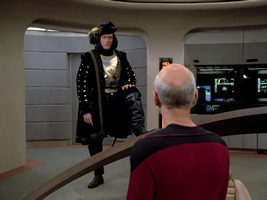
 "Encounter at Farpoint"
"Encounter at Farpoint"